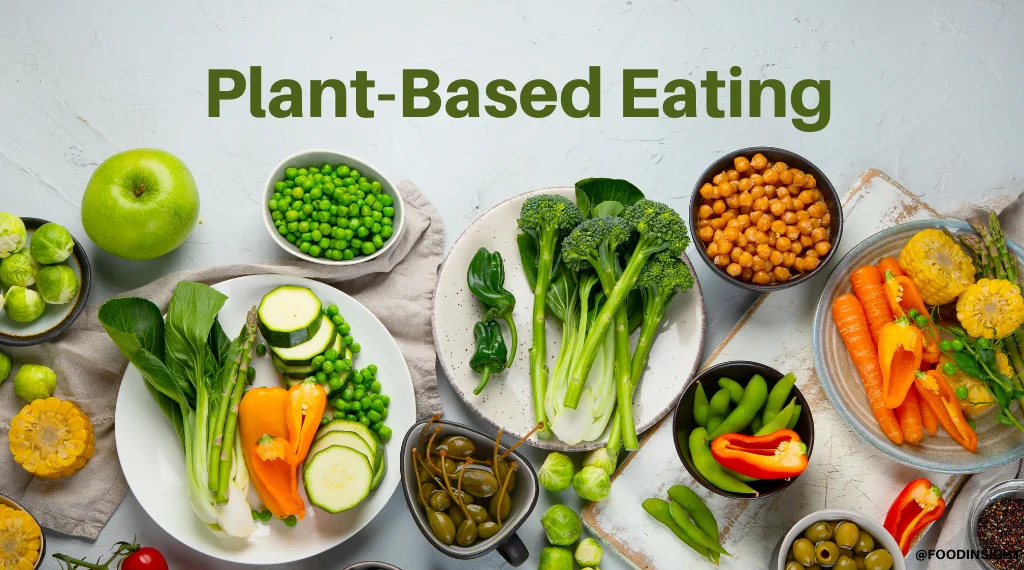The Truth About Plant Based Beef: Taste Test Results & Nutritional Facts
The Truth About Plant Based Beef: Taste Test Results & Nutritional Facts
Blog Article
Everything About Healthy Food: Benefits of Checking Out Plant Based Alternatives
The discussion surrounding plant-based diet plans has actually gotten substantial focus recently. Numerous people are checking out the prospective health and wellness benefits, nutritional benefits, and environmental effects connected with these nutritional choices. As people end up being extra conscious of their food's impact on wellness and sustainability, inquiries arise about the usefulness of taking on such a way of living. What specific changes can one anticipate, and how might these selections improve not only individual health and wellness however additionally the world's future?
Recognizing Plant-Based Diet Regimens
Although lots of people link plant-based diet plans mainly with vegetarianism or veganism, these diets can encompass a vast array of eating patterns that prioritize entire, minimally refined plant foods. Such diet plans frequently consist of fruits, vegetables, entire grains, seeds, vegetables, and nuts, while restricting or removing pet items. This adaptability enables individuals to customize their nutritional choices according to individual preferences and dietary needs. Some might adopt a primarily plant-based diet while still periodically consuming meat or dairy products, typically described as a flexitarian strategy. The emphasis continues to be on integrating more plant foods, which can bring about a varied variety of dishes and flavors. Comprehending these different interpretations of plant-based eating is necessary for appreciating its access and charm in contemporary food society.
Wellness Advantages of Plant-Based Foods
The wellness advantages of plant-based foods are substantial, providing a nutrient thickness advantage that supports total wellness. Research suggests that these foods can enhance heart health and wellness and play a vital duty in reliable weight management. By including a lot more plant-based choices, individuals might improve their nutritional choices and advertise lasting wellness.
Nutrient Density Advantage
Nutrient thickness plays an essential function in the health and wellness advantages of plant-based foods, making them a compelling choice for those looking for a well balanced diet regimen. Plant-based foods, such as fruits, vegetables, legumes, nuts, and entire grains, are typically abundant in important vitamins, minerals, and anti-oxidants while being reduced in calories. This high nutrient thickness permits people to eat less calories while still satisfying their dietary needs. In addition, these foods are packed with nutritional fiber, advertising digestive system health and wellness and aiding in weight monitoring. By integrating nutrient-dense plant-based alternatives, consumers can improve their total health, support their immune systems, and minimize the danger of persistent illness. Eventually, the nutrient thickness of plant-based foods underscores their relevance in a health-conscious lifestyle.
Heart Health Renovation

Weight Management Support
In enhancement to promoting heart health and wellness, a plant-based diet can substantially assist in weight monitoring. This dietary strategy highlights entire foods such as fruits, vegetables, legumes, nuts, and whole grains, which are typically reduced in calories and higher in fiber compared to animal-based products. The high fiber web content aids enhance satiety, lowering overall calorie consumption. In addition, plant-based diets are usually abundant in crucial nutrients while reduced in unhealthy fats, making it much easier to preserve a healthy weight. Gluten Free BBQ Sauce. Study suggests that individuals that adopt a plant-based way of life often tend to have reduced body mass indexes (BMIs) and experience even more successful weight-loss contrasted to those who eat meat-heavy diet regimens. Subsequently, welcoming plant-based alternatives is a calculated option for efficient weight administration
Nutritional Value of Plant-Based Components
Plant-based components are rich in crucial nutrients, using a diverse range of vitamins, minerals, and antioxidants that add to general wellness. A contrast of healthy protein sources exposes that while animal items are commonly deemed superior, several plant-based options give adequate healthy protein and various other beneficial substances. Understanding the dietary value of these components can assist individuals make educated dietary options.
Important Nutrients in Plants
Nutrient-rich ingredients located in plants provide a diverse array of important minerals and vitamins that add considerably to overall wellness. These components are rich in vitamins A, C, and K, which sustain immune function, vision, and blood clot, respectively. In enhancement, plants supply vital minerals such as potassium, magnesium, and calcium, critical for heart health and wellness, muscular tissue feature, and bone toughness. The presence of fiber in plant-based foods help digestion and advertises a healthy gut microbiome. Antioxidants, located perfectly in vegetables and fruits, assistance combat oxidative stress and decrease swelling. In addition, numerous plant foods are reduced in calories yet high in nutrients, making them a superb selection for those seeking to keep a healthy and balanced weight while making certain ideal nutrient consumption.
Comparing Protein Sources
Healthy protein resources vary considerably in their dietary accounts, with plant-based ingredients supplying one-of-a-kind advantages. Unlike pet healthy proteins, which commonly contain hydrogenated fats and cholesterol, plant proteins often tend to be lower in these undesirable parts. Legumes, nuts, seeds, and entire grains are rich in crucial amino acids, fiber, vitamins, and minerals. For instance, lentils offer high healthy protein material together with significant iron and folate, while quinoa is a total protein, supplying all 9 vital amino acids. Furthermore, plant-based healthy proteins are commonly accompanied by antioxidants and visit this web-site phytochemicals that sustain overall health and wellness. The shift to plant-based protein sources not only enhances nutritional consumption yet likewise lines up with sustainable dietary techniques, lowering environmental influence and advertising long-lasting health advantages.
Ecological Influence of Plant-Based Consuming
As recognition of climate modification grows, many individuals are exploring sustainable nutritional options that can substantially reduce their environmental impact. Plant-based eating has emerged as a substantial factor to lowering greenhouse gas emissions, which are mainly linked with livestock manufacturing. The cultivation of fruits, vegetables, beans, and grains usually requires less resources, such as water and land, contrasted to animal farming. In addition, plant-based diet plans can bring about reduced logging, as less land is needed for grazing animals or growing animal feed. By moving in the direction of plant-based alternatives, customers can support biodiversity and advertise healthier ecological communities. In general, welcoming plant-based eating not just benefits individual wellness yet likewise stands for a crucial step toward ecological sustainability and conservation efforts.
Conquering Common Misconceptions
While many individuals acknowledge the benefits of a plant-based diet, a number of mistaken beliefs frequently prevent them from fully embracing this way of living. An usual idea is that plant-based diet plans lack adequate protein; nonetheless, numerous plant sources, such as vegetables, nuts, and tofu, offer sufficient healthy protein. Additionally, some assume that this diet is pricey, when actually, staples like beans, rice, and seasonal veggies can be fairly inexpensive. One more mistaken belief is that plant-based consuming is extremely restrictive, whereas it really offers a varied array of tastes and foods. Lots of stress that a plant-based diet regimen may lead to deficiencies, yet with appropriate preparation, people can acquire all required nutrients, including vitamins and minerals, while enjoying a large variety of delicious meals. Vast Tips for Transitioning to a Plant-Based Way of life
Making the change to a plant-based lifestyle can be an improving experience, though it typically needs some support to navigate the initial modifications. Initially, individuals are motivated to start gradually, incorporating more fruits, vegetables, vegetables, and whole grains into their meals while minimizing meat and dairy usage. Meal preparation is necessary; preparing an once a week food selection can help relieve the change and protect against last-minute harmful choices. Checking out brand-new dishes and cooking techniques can likewise improve the experience and maintain exhilaration concerning plant-based consuming. Furthermore, signing up with support system or communities can supply motivation and share important tips. Finally, remaining educated concerning nourishment warranties balanced dishes, preventing deficiencies while fostering a healthy and balanced, enjoyable plant-based lifestyle.
Delicious Plant-Based Meal Concepts
Discovering tasty plant-based meal ideas can motivate individuals to welcome a more healthy diet regimen. One prominent alternative is a hearty quinoa salad, including cherry you can try these out tomatoes, cucumber, and a official website zesty lemon-tahini dressing. One more favorite is a savory lentil stew, packed with carrots, celery, and aromatic herbs, ideal for a calming supper. For breakfast, overnight oats made with almond milk, chia seeds, and topped with fresh berries supply a healthy begin to the day. In addition, a dynamic vegetable stir-fry with tofu and a range of vibrant veggies can be a fast yet pleasing dish. Creamy avocado toast on whole-grain bread, sprayed with seasonings and seeds, provides a straightforward yet delicious snack. These dishes showcase the variety and splendor of plant-based consuming.

Regularly Asked Concerns
Can a Plant-Based Diet Plan Supply Enough Healthy Protein?
The concern of whether a plant-based diet can provide sufficient healthy protein prevails. Many resources, including beans, nuts, seeds, and entire grains, can fulfill protein requires properly, sustaining a nutritious and balanced diet for people.
Are Plant-Based Diet Plans Ideal for Kid?
The viability of plant-based diet plans for youngsters depends upon cautious preparation. Appropriate nutrients have to be assured, including vitamins, minerals, and proteins. With proper advice, such diet plans can sustain healthy development and growth in children.
Exactly how Do I Dine Out on a Plant-Based Diet regimen?
Eating in restaurants on a plant-based diet regimen entails looking for restaurants with diverse menus, requesting for adjustments, and checking out vegan-friendly choices. Planning ahead and connecting nutritional preferences can boost the dining experience while maintaining dietary choices.
What Are Usual Irritants in Plant-Based Foods?
Typical allergens in plant-based foods include soy, gluten, nuts, and seeds - Plant Based Beef. People complying with a plant-based diet plan needs to understand these allergens and check out tags very carefully to stay clear of unfavorable responses and assure risk-free intake
Can Plant-Based Diets Assist With Fat Burning?
Research study indicates that taking on a plant-based diet regimen might promote weight management because of its generally lower calorie thickness and greater fiber content. This mix can enhance satiety, aiding people handle their caloric consumption properly. Lots of people connect plant-based diet plans mainly with vegetarianism or veganism, these diet plans can incorporate a large array of consuming patterns that prioritize whole, minimally processed plant foods. Nutrient thickness plays an essential function in the health benefits of plant-based foods, making them an engaging option for those seeking a balanced diet. Plant-based diet regimens have actually been shown to noticeably boost heart health and wellness, as they frequently include components that sustain cardio function. In addition to advertising heart wellness, a plant-based diet can considerably aid in weight monitoring. A common belief is that plant-based diet regimens lack sufficient healthy protein; nonetheless, countless plant sources, such as vegetables, nuts, and tofu, offer adequate protein.
Report this page